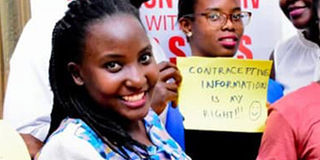Nalugo is helping others fight stigma

Queen. Sharifah Nalugo was Miss Y+ (HIV positive) 2014/15. COURTESY PHOTO
What you need to know:
- She says she had to be strong after knowing the truth. “My mother was scared so I could not be scared too. I had to be there for her. She told me that all those children I was always with at the clinic were also HIV positive. I did not make it a big deal since I knew that my friends too were HIV positive,” Nalugo narrates.
Having faced a lot of criticism and stigma while at school, Ms Sharifah Nalugo vowed to fight discrimination against people living with HIV/Aids.
During her tenure as Miss Y+ (miss HIV positive) 2014/15, the 23 year old choose to fight discrimination in schools against those living with HIV because she knew what it meant and how it felt.
Nalugo believes once a queen you are always a queen, and this has made her continue the struggle regardless of having completed her tenure as Miss Y+.
Beginning
As a child, Ms Nalugo’s mother always took her to hospital, but Nalugo did not know the real reason why she was being taken there. It happened that she had tuberculosis (TB) at the time and her mother always told her the medication was meant to cure the cough.
“I hated cough and I had to take the medicine because I never wanted the cough to come back,” she says.
But in 2006, while she was in Primary Seven, her mother decided to tell her the truth. Nalugo was HIV positive.
She says she had to be strong after knowing the truth. “My mother was scared so I could not be scared too. I had to be there for her. She told me that all those children I was always with at the clinic were also HIV positive. I did not make it a big deal since I knew that my friends too were HIV positive,” Nalugo narrates.
Time came when Nalugo had to join secondary school and her mother decided to give her medicine to the matron. Her mother did not trust her to take the medicine on her own.
Nalugo had to go to the matron’s house every 7am and 7pm, although sometimes the matron would pick her up from the dormitory.
Fellow students started wondering why Nalugo always went to the matron’s house at that specific time. She managed to create a reason that she had a heart problem, but excuse could only last for a short while.
Discrimination starts
One day, Nalugo decided to disclose her HIV status to her friend after all sorts of rumours circulated at the school.
In a bid to protect Nalugo from other students that were making her uncomfortable, her friend decided to tell some other friends, thinking they would fight all those disturbing Nalugo.
However, they instead spread it to the rest of the school.
“Wherever I would pass, I found groups of people talking about me. My fellow students started waiting for 7am and 7pm to see if I would go to the matron’s place to prove their suspicions right,” Nalugo says.
After a couple of days and nights of feeling hated, Nalugo decided to tell the entire school the truth.
“One day while at the school parade, I volunteered to pray but then people started talking. I then decided to tell the entire school there and then as the first announcement. I said, ‘before I pray, yes I am HIV positive, and now let’s pray.’ Then I prayed,” Nalugo adds.
Fighting discrimination
Having felt the pain of discrimination while in secondary school, Nalugo vowed to help other children and let them know that there is hope for them and they could be anything they wanted to be, regardless of their status.
Nalugo currently works at the Joint Clinical Research Centre as a peer counsellor. “Since I did not study counselling at university, sometimes I use the PATA (Paediatric Adolescent Treatment App) to help,” Nalugo says.
At the clinic she advises young mothers, gives hope to her peers living with HIV and young mothers with mental problems.
Nalugo has been able talk to children in different schools about the potential they have, but also uses social media to pass on the message, especially Facebook.
“I usually tell young people with HIV to work on the useful things first and other things will come. People living with HIV should accept who they are and have confidence. It is just a virus, it cannot define me,” Nalugo says
“Show them that you can even do more than them. When they see you excelling, for example in class, they will start looking at your grades.”
Nalugo wishes that government not only recognised health workers, but also those people living with HIV who have made it a point to make a change.
Discovery
In 2006, while she was in Primary Seven, her mother decided to tell her the truth. Nalugo was HIV positive.
She says she had to be strong after knowing the truth. “My mother was scared so I could not be scared too. I had to be there for her. She told me that all those children I was always with at the clinic were also HIV positive. I did not make it a big deal since I knew that my friends too were HIV positive,” Nalugo narrates.




